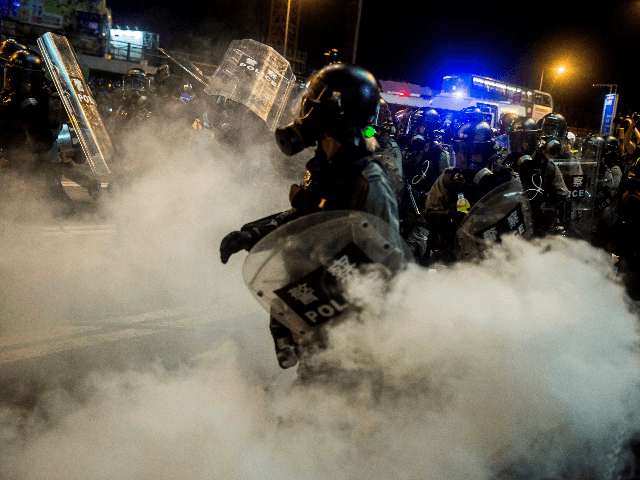China’s nightmare scenario is that Hong Kong’s huge protest movement could spread to other cities – especially Macau, which is only an hour away and also has semi-autonomous “Special Administrative Region” status.
Macau has never been as restless, but there are signs the pro-democracy movement is spreading slowly among its youth, inspired by the dramatic events in Hong Kong.
“While Macau’s youth are not as politically engaged as their counterparts in Hong Kong, a small but increasingly vocal group of youngsters are seeing the protests as a stage to express their grievances and fight for a common cause,” the South China Morning Post reported on Friday.
Macau students told the SCMP they are growing bolder about speaking out as the Hong Kong saga continues, sensing their own government will take a lighter touch with them because it fears touching off anything like the mass protests rocking the other Special Administrative Region. Some of Macau’s youth work in Hong Kong or make frequent visits there, giving them first-hand exposure to the protest movement and an opportunity to participate in demonstrations.
On the other hand, young activists told the SCMP that Macau residents who do not personally visit Hong Kong tend to support its government and police, in part because their access to information is tightly controlled, especially for the large portion of the population that speaks only Chinese and cannot access the more robust Portuguese- and English-language media in their city. Macau politics are shaped by the large number of people who work directly for the city government, which provides generous welfare benefits financed by the thriving casino industry.
Some observers suggest the Portuguese colonial administration of Macau did not run the city as efficiently as the British did in Hong Kong, or work as hard to train local civil servants to take over after control of the two cities returned to China, so Macau had a more positive overall impression of the Chinese takeover and less apprehension about losing precious democratic rights to authoritarian control. Hong Kong demonstrators enjoy mocking China by waving British flags and wishing the colonial administration could return, while Macau seems to have little nostalgia for Portugal.
Macau’s administration is nevertheless nervous enough about the democracy contagion spreading to ban several residents from visiting Hong Kong merely because they were wearing black, a color widely associated with the protest movement. Macau’s politically-aware youth scoffed at this clumsy effort to quarantine their city and rejected efforts to paint the Hong Kong protesters as out-of-control violent radicals.
“In Macau, if you protest or if you openly support the movement, you will probably lose your job, receive threats and be watched by the police,” 20-year-old student Christine Kuok told the SCMP.
“It’s quite painful for youth like me in Macau. I only feel alive when I am in Hong Kong or in Taiwan,” she said.
Analysts noted the Macau administration is fairly adept at minimizing that pain by making strategic concessions when protest movements get serious. For example, Macau quietly shelved its own extradition reforms when Hong Kong erupted in outrage over a bill that would make extradition to mainland China easier.
Macau’s young activists seem increasingly angry with the way Beijing and its loyalists in Hong Kong are painting the protesters as unpatriotic, seditious, or working as saboteurs on behalf of Western governments. They are clearly signaling this is an insult they will not tolerate in Macau, and watching Hong Kong protesters get branded as traitors is strengthening the sense of connection between democracy-minded people in both cities.
“Some of them, like myself, want to love the country, but the country doesn’t love me back. We are fighting against a regime,” said one Macau activist.
Macau is definitely feeling the effects of Hong Kong unrest. Casino revenue is beginning to suffer as fears of a Chinese police or military crackdown in Hong Kong grow. The collapse of Hong Kong’s tourist industry due to protests could shift some business in Macau’s direction, but some analysts think the overall impact will be negative as the entire region grows more apprehensive and less appealing to visitors and travel becomes more difficult due to shutdowns of the Hong Kong airport.
“When you have hundreds of flights canceled out of Hong Kong and some reluctance to travel, I do think that’s impacting the premium end of the business,” Wynn Resorts chief executive Matt Maddox observed this week, bracing the Macau hospitality industry for even worse times to come.
Macau’s generally better economy and lower levels of frustration among its youth are often cited as reasons why it has been more content with Chinese rule than Hong Kong. Regional economic turmoil could change that equation.

COMMENTS
Please let us know if you're having issues with commenting.